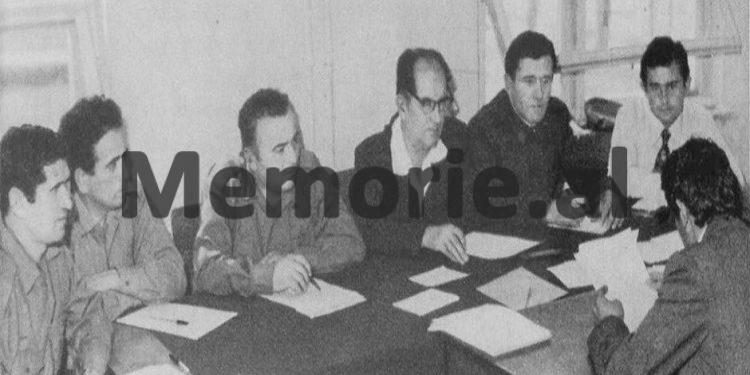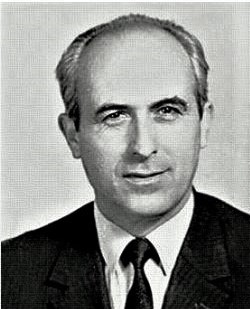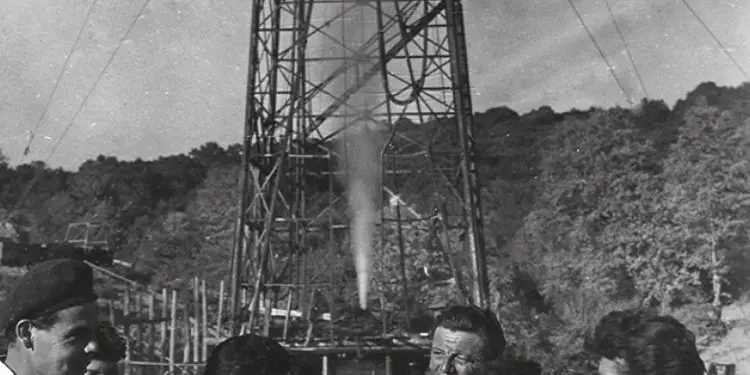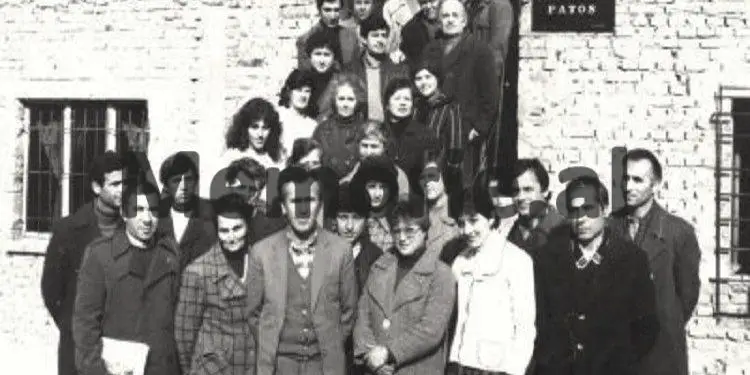By Petraq Xhaçka
Part twenty-one
Memorie.al / The purpose of this book is to unite the help in the efforts that are made, to present the truths and horrors of the communist dictatorship in Albania. The main purpose of the book is not to show our people or anyone else, that we oilmen have been innocent, because this has become known from publications in our press, from foreign televisions, as well as from direct meetings with the International Forum and the Albanian Human Rights. The author’s desire, is that through this story, together with other stories, fight any manifestation in any form, even moderate, that he may have to create a communist society. I think that even through this bitter personal history, the cruel, treacherous and overbearing face of Enverism will appear, that for half a century, held the knife with the tip in the chest of the Albanian people, with a pine eye, intercepting the movements for salvation from the outside, or rebellion of the people themselves, ready to push the knife to the heart, at the first movement. The events are set in the economic fields where it has appeared most strongly, such as the oil and gas industry, where I was fortunate to pour my energies, for a lifetime, and become a participant and witness in those events. All the events that are written in this memoir are true, not only without any exaggeration or embellishment, but perhaps, I don’t know how much I was able to present the terrifying force of the events that took place in that decadent system of socialism, where no there was no human feeling.
I didn’t make myself, I didn’t spoil the dinner, but I didn’t leave him without an answer either, with the self-control more elevated than ever. -“Enver Hoxha said what he wrote about oil before they happened and they were absolutely not written after the events. This is where big people differ from the rest of us, the little ones”! Apparently not to raise any more doubts in me, he continued the conversation, saving for me a good, very important news. He told me that a few days ago, when he had gone to a family in Lushnje to wish them a birthday, two people who worked in the Central Committee of the Party came to congratulate him.
-When they found out that I was working at the Petroleum Institute, they mentioned you and they said to me: “Do you know that Petraq Xhaçka, we will transfer him to work at the University? Petraqi has given a lot to the oil industry and now he is very tired”. Honestly, that’s what they told me! – “Who were those two people”? – I asked without much enthusiasm. – “I don’t remember their names”, he said! He was not one of those people who could not remember names, especially people who worked in the Central Committee. – “Maybe, maybe”, – I told him to close it. In an instant I remembered that such news and, in this way, had also been transmitted to my wife, when she had gone to visit a family. And there, a person present, said that he had heard this from people in charge of the state apparatus, that; “Petraqi will be transferred to the University, as if he is tired of work”.
And this person who was telling Jean also couldn’t remember the names. After a while I told my colleague that it was time to leave the restaurant and he accompanied me home. All these were provocations, so that they could find some reason, as a political gimmick, to popularly justify my immediate arrest. All my life, in fact, I had not allowed myself expressions of this nature, with anyone. The fall of 1985 was leaving us. One night, around ten o’clock, a driver from the Oil Institute came to my house and informed me that by order of the director of the Institute, I had to appear the next day in Tirana, at seven o’clock in the morning, at the office of the Minister of the Interior. Hekuran Isait. The director told the driver that the meeting would be related to a letter that I had sent to the minister.
-“It will be a mistake”! – I asked him in surprise. – “I have not sent any letter to the Minister of the Interior”. – “I don’t know”, – the driver replied, annoyed and temporarily happy, that I was crying out for him, inviting him to my conjectures. -“It’s obvious, a misunderstanding”! – I stood still, even though I saw that the driver did not care about my problem at all. – “It will surely be another person, who has the same name and surname as mine. I know, he is a deputy minister.” – “I was told about you,” said the driver. – I also know the deputy minister. But it’s about you.”
Then I decided to go immediately to the director’s house. It was getting late, but I had to go. The phone was taken away from me in those days, so I had to go there myself. The Director of the Institute received me extremely coldly, as if seeing me for the first time in his life. After listening to me, he made it clear to me that they had called him and given him an order just for me. They had told him that everything was connected to the letter. Then, without further ado, I had to leave for Tirana. Early the next day, at four o’clock in the morning, I left for the capital and at the appointed time, I presented myself to the officer, who was sitting behind a counter, at the entrance, from the back side of the ministry building. I handed him my passport and told him that I had been notified to be at the minister’s office at seven o’clock sharp. He filled out my entry form, got someone on the phone and told me to wait for them to come pick me up.
This was that infamous building, so disgusting to the people, for the many crimes that had been committed in it, for so many people’s stories, that began with the phrase; “he entered the Ministry of the Interior and was never seen leaving again…”! The building seemed to be weighed down by the tens and hundreds of thousands of files that were piled up there. I imagined some of them open, while many were closed forever, with a dusty finger on top. I was worried about the call that this minister had made to me, who had long since left the oil problems. Especially that mysterious letter that the director and the driver put in my mouth caused me a secret concern. I had never written to Hekuran Isai, nor to any other minister!
A young officer invited me to accompany him through the long corridors, leading to the minister’s antechamber. In front of the door, two people were sitting on a sofa, who seemed unknown to me at first, but who I later got to know very well: one was the General Prosecutor of the Republic, Rrapi Mino, while the other was the Chairman of the General Investigation. , Qemal Lame. I didn’t greet them and they didn’t see fit to greet me either. To the right was an office where the secretary stood, who, after announcing my arrival on the phone, got up and ushered me into the minister’s office.
The headmaster’s office was located on the side of the main entrance facade, in front of the Ministry of Defense. It was quite spacious and nicely furnished: the Minister greeted me very coldly with his head and invited me to sit in a chair, at a long T-shaped table. He told me from the beginning: “I know that you have not written any letter.” I thought we should tell others like this, so that people don’t sit around wondering why I called you. That’s how they will judge that I asked you for a certain letter, period!
I was listening to his words with great attention and respect. During the time when he was performing the duties of the Special Commissioner for Oil, after the events of 1975, we had the opportunity to meet many times, because he called us for meetings, or for reports on oil research problems. This coincided with the period when the Institute scored very high results in the discovery of new sources and as a result, he had a relatively good attitude towards the Institute and towards me. Apparently, at least, it was. At that time, I did not understand the role of the Special Commissariat, where four people participated, and one of them was a responsible employee of the State Security.
At first, we were told that it came from Lenin’s experience in Russia, in the post-revolution period, when power was in strong hands and this Commissariat stood above the ministries and even higher than the Prime Minister’s office. Isai worked in a military style, he didn’t discuss, he asked very briefly about the jobs and in the end, he gave the orders in writing, which had to be signed by the managers of the various enterprises that received these orders. It said what we had to do and when. For any violation, a strict attitude was maintained, up to dismissals on the spot, and of course with other consequences later. This was the typical style of the organs of the dictatorship, which had the power to arrest on the spot, which the ministries and the prime minister did not have!
The minister started asking me what I thought about oil exploration, where the prospective structures were, and where I thought that drilling should be prioritized. He also asked me about some very technical issues that arose in the search for gas in the Durrës area and an accident in a well in the Elbasan area. He focused there and asked for detailed explanations about some analyzes that we had carried out for geo-chemistry and whether those low values indicated or not that our country had gas. I gave him the theoretical explanations, which I did not know if he understood, with the little culture he had. Using a simple language, I tried to make it clear to him that gas is found, even at these values, although they are lower than what is accepted in the literature of some countries, as a minimum limit for it to form.
However, I told him that this did not exclude the possibility of the formation of natural gas, in the sandstone rocks, and the case of our country, where we had discovered reserves, shows that. Anxiety and insomnia were disappearing as if by magic, and this relief made me a little speechless. I basically did not understand why all this theoretical culture was begging the Minister of Security. I remembered that recently, I happened to be in a meeting of the collective, where the director attacked the geo-chemist of the Institute, Dhimitër Prifti, with the most outrageous accusations, relying only on defamatory statements, as if he had given defeatist statements, that with those low indicators, gas could not form.
Dhimitri completely denied this, he even said that on this topic, he had published entire studies, and on no page of the studies did he reach such negative conclusions. The geo-chemist was very disturbed by these attacks and several times I saw him faint in the middle of the road. His condition was aggravated even more, because the early avazas had not yet been closed. A few years ago, I was in Italy for an exchange of experience, for a three-month period at AGIP, together with two other colleagues. One evening while they were walking through the streets full of advertisements, he made a remark: – “Oh, I don’t understand, why do these people keep all these advertising lights on for nothing? Let them save the oil for the cars, because the spirit has come to the tip of their noses, supplying one day odd-numbered license plates and the next day even-numbered ones”!
A member of the group had reported Dhimitri’s statement in Sigurim, but transformed it, as if he had said that the Albanian press was not telling the truth when it said that there was no fuel for the cars in Italy. This denunciation saw Dhimitre hit several times in the Department of Internal Affairs and he was almost arrested, if the third specialist, you would not have really shown how poor Dhimitre expressed himself. It was also helped by the fact that the specialist who had told the truth had a relative with great responsibility in the State Security. Fate, then, saved him from imprisonment. In the conversation with the minister, I thought it reasonable to let him know that the specialist in question could not be so pessimistic about gas, since he had never shown such thoughts in the complete studies carried out by him, and approved by the Scientific Council of the Institute. We had the studies there, and they spoke in his favor. I am pleased to believe that this explanation took the rope off the neck of my geo-chemist colleague for the second time.
These conversations gave me the impression that Minister Hekuran Isaji had simply called me, as a specialist is called, to get his opinion on oil research problems. And maybe the minister needed these to prepare for a meeting in the government or in the Political Bureau. The terror and anxieties of the night before were completely gone. But the pear has its tail behind, says a proverb of our people. My composure was soon shattered when, after we had finished our initial discussions, he suddenly took a new turn to the conversation. At that moment, the Minister of the Interior had just brought a large stack of files to his desk. And he asked me a question:
-“Have you heard such thoughts, as if the prospect for oil in Albania is very small”? I replied that I had never heard of it. At least to me, I told him that you had not told me anyone. Then he opened one of those files, on which I couldn’t see what was written on it and I couldn’t guess what was hidden inside it. – “Mynyr Arapi,” the minister began sullenly, “is an enemy.” He spreads such thoughts, about the little perspective of our country, about oil and gas, thoughts that contradict those of the Party and the teachings of Comrade Enver. Therefore, in a meeting that we intend to hold, you must condemn this enemy”.
I became a total jerk. – “Comrade minister, – I replied, – I have known Mynyri for tens of years and I know him not only as a good specialist, but also very connected to the Party. From his family there were all those partisans, good soldiers, up to his uncle, who was a general. I have never heard such dark thoughts from him on the subject of oil and gas exploration. This was the reality I know in my frequent working relationships with him. As a member of the directorate at the Ministry, he often comes to check and exchange opinions on the studies we do and he gives his contribution to oil research”.
It seemed easier for me to go to Mynyri’s side with the minister, than in other circumstances. – “I don’t know that he is an enemy, – I finished the speech, – and I have no way to condemn him as such”. The Minister of the Interior, dissatisfied with my opposition, told me nervously: – “We know that he is an enemy! We will present this data. When you hear them, you will rise up in discussions, you will condemn him as an enemy. Do you understand me? Are you clear? The ceiling fell on my head. With this order he rose to say that he ended the conversation. Before I left, the minister ordered me not to talk to anyone about what was said there. – “You will have serious consequences”! – Hekuran Isai warned me. The officer who escorted me in came to take me back. When I was leaving the office, I noticed that both of those people were still sitting there on the couch. The door to the minister’s secretary was open and I saw him gathering the cables of a large tape recorder. I realized that our entire conversation of nearly two hours had been recorded.
I left the ministry quite shocked. I felt very sorry for Mynir. He would surely be arrested. I knew Mynyr Arapi since he was a student at the Petroleum Technical College and I taught there. Then the whole period, from the 60s until that black day of 1985, when this conversation took place, work connected us together. He was a skilled geologist, he tried to ensure that the studies had quality and no mistakes were found in them. He tried to analyze the factual, geological and laboratory data with an exemplary seriousness. Mynyri, being also in our ministry, was against the inflated plans drawn up by the state leadership, and tried, as much as he was allowed, to lower these figures, so that they correspond better to our reality.
This honest man, even loyal to that power, in the days to come, would be declared the next enemy! It was amazing news. It was a terrible blitz, like many before, in the oil industry. Just as I was shocked by the fate of my colleague, my feet were leading me towards the Ministry of Geology and Mines, where I made an appointment with the driver of the car, who brought me to Tirana. Suddenly, the worst coincidence, the most bitter surprise, brought me to the street near the ministry, I saw Mynyri, he was facing me. And he didn’t have his usual happy, smiling look. He also looked worried. But he had no way of knowing what I knew. He invited me to go and have a coffee at the ministry building. I was in two minds.
Damn it, I had just come out of that unfortunate meeting and now I could feel the eyes of the Security, locked on both of us. Mynyri was the last person I had to meet and suddenly, he was now the first. Hanging out with him, being alone in some café, would be deadly for both of them. Who had lived in Albania at that time, and did not know this! I avoided the proposal. No matter how stupid the reason seemed, I told him that I was tired, that I had some work that required me to return to Fier immediately, and I broke up with him from there. This was our last meeting, until the arrest, and even later, until the end of our trial, a chain of events that, until that day, did not even occur to me that they would happen to me. I had no supernatural power to read my fate in the closed files of the head of Security, Hekuran Isai.
No one had made me aware of what had happened a short time before this day, that I was called to the Ministry of the Interior. Even, it was not known whether Mynyri himself would confess to me, if we had gone together that day for coffee. Even when Mynyri and I were recalling this episode, later, after a year in prison, he was not sure if he would tell me about his tragic adventure. Here’s what happened:
A few days ago, Mynyri had landed in Fier, on one of his usual services. There, the employees of the Internal Oil Department were waiting for him, led by their deputy head, Sotiraq Mici. They had dragged him to the building of the annex of Hotel Turizmit and kept him there for five consecutive days and nights. They had put him in one of the apartments of this hotel, which was mainly used for housing foreign specialists who worked in Fier, but were not there these days. The hotel annex was completely empty. Only officers of the Ministry of Internal Affairs entered and left there, headed by the deputy minister, who covered State Security. The officers had taken Mynyr into custody, without any official arrest warrant.
For these violations of the laws, they were not accountable to anyone, because they made the law in Albania. Those of the Security, asked Mynyri to “dissolve” some opinions that had not appeared, related to the lack of great perspective, for oil and gas research in our country. As Mynyri told me later, he was beaten, tortured and constantly pressured to admit that his opinions were contrary to the theses of the party and Enver Hoxha on oil. He had tried to convince them that his statements were distorted and misinterpreted on purpose and that he had not talked with geo-physicist or geologists colleagues about structures or special areas, which have no perspective, such as Durrës , from which no gas was expected. It was not wrong, Mynyri told them, to talk about specific areas, which everyone knew were barren.
But he had never spoken about the country as a whole. This was illustrated by the fact that he himself had participated in several research well designs. Then they played the tapes, on which they had recorded Mynyri’s conversations with work colleagues. He objected to them because they seemed to be elaborate, making combinations of different expressions. So, for example, the saying that; “Durres structure, no gas or oil” was grafted with another phrase; that was found elsewhere in the voice of the geologist, the phrase “in our country”, was replaced by “the structure of Durrës”, with “in our country” and as a conclusion, the saying came out, that; “in our country, there is no gas or oil”. The tape recorder said it, but you didn’t say it, Mynyri!
With these elaborations, they deduced that the geologist was pessimistic about the prospect of oil and gas research in our country, and for this they beat him, mistreated him and demanded that he admit that this was a hostile act. Let’s admit that these were all as the State Security had assembled them, but why should they be considered hostile?! Why was a geological opinion hostile to us, which was spoken openly and freely and debated with specialists, so that a solution could be found?! A country with such terror could never move forward. They were the enemies of this country and not the specialists, who gave opinions to make the direction of the country’s economy more effective! Memorie.al














